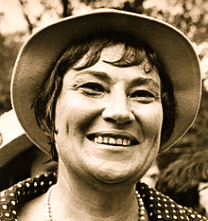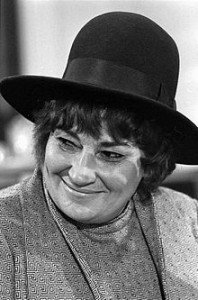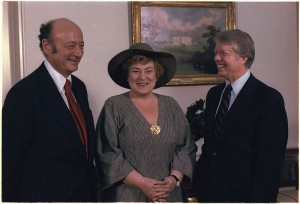Bella Abzug

Bella Abzug
Powerful Woman.– Created using PowToon — Free sign up at http://www.powtoon.com/ . Make your own animated videos and animated presentations for free. PowToon is a free tool that allows you to develop cool animated clips and animated presentations for your website, office meeting, sales pitch, nonprofit fundraiser, product launch, video resume, or anything else you could use an animated explainer video. PowToon’s animation templates help you create animated presentations and animated explainer videos from scratch. Anyone can produce awesome animations quickly with PowToon, without the cost or hassle other professional animation services require.
 Member of the U.S. House of Representatives
Member of the U.S. House of Representatives
from New York‘s 20th district
Bella Savitsky Abzug (July 24, 1920 – March 31, 1998), nicknamed “Battling Bella“, was an American lawyer, U.S. Representative, social activistand a leader of the Women’s Movement. In 1971, Abzug joined other leading feminists such as Gloria Steinem and Betty Friedan to found the National Women’s Political Caucus. She declared, “This woman’s place is in the House—the House of Representatives,” in her successful 1970 campaign. She was later appointed to chair the National Commission on the Observance of International Women’s Year and to plan the 1977 National Women’s Conference by President Gerald Ford and led President Jimmy Carter‘s commission on women.
Early Life
Bella Savitsky was born on July 24, 1920, in New York City. Both of her parents were Russian Jewish immigrants. Her mother, Esther, was a homemaker and her father, Emanuel ran the Live and Let Live Meat Market.
When her father died, Abzug, then 13, was disallowed to say the Mourner’s Kaddish for her father in synagogue, since that rite was reserved for sons of the deceased. However, she did so as one of her first feminist actions because her father had no sons.
Abzug graduated from Walton High School in New York City, where she wasclass president, and went on to Hunter College of the City University of New York, later earning a law degree from Columbia University in 1947. She then went on to do further post-graduate work at the Jewish Theological Seminary of America.
Legal and political career
Abzug was admitted to the New York Bar in 1947, and started practicing in New York City at the firm of Pressman, Witt & Cammer, particularly in matters of labor law. She became an attorney in the 1940s, a time when very few women practiced law. During this time, she began wearing wide-brimmed hats to work to ensure that she wasn’t mistaken for a secretary. The hats became her trademark.
Early on, she took on civil rights cases in the South. She appealed the case of Willie McGee, a black man convicted in 1945 of raping a white woman in Laurel, Mississippi and sentenced to death by an all-white jury who deliberated for only two-and-a-half minutes. Abzug lost the appeal and the man was executed. Abzug was an outspoken advocate of liberal causes, including the failed Equal Rights Amendment, and opponent of the Vietnam War. Years before she was elected to the House of Representatives, she was a co-founder of Women Strike for Peace. Her political stands placed her on the master list of Nixon political opponents. She has been nicknamed “Battling Bella.”
In 1970, she challenged the 14-year incumbent, Leonard Farbstein, in the Democratic primary for a congressional district on Manhattan‘s West Side. She defeated Farbstein in a considerable upset, and then defeated talk show host Barry Farber in the general election. In 1972 her district was eliminated via redistricting and she chose to run against William Fitts Ryan, who also represented part of the West Side, in the Democratic primary. Ryan, though seriously ill, defeated Abzug. However, Ryan died before the general election and Abzug defeated his widow, Priscilla, in a party convention to choose the new Democratic nominee. In the general election Priscilla Ryan challenged Abzug on the Liberal Party line, but was unsuccessful. In the general election she was reelected easily in 1974. For her last two terms, she represented part of The Bronx as well.
She was one of the first members of Congress to support gay rights, introducing the first federal gay rights bill, known as the Equality Act of 1974, with fellow Democratic New York City Representative, Ed Koch, a future mayor of New York City.
Bella also chaired historic hearings on government secrecy. She was voted by her colleagues the third most influential member of the House as reported in U.S. News & World Report. Bella was known for her keen intelligence, her flamboyance and her colorful wide-brimmed hats. Often recognized by these vibrant hats, Bella reminded all who admired them: “It’s what’s under the hat that counts!”
 Representative Bella Abzug at press conference for National Youth Conference for ’72, November 30, 1971.
Representative Bella Abzug at press conference for National Youth Conference for ’72, November 30, 1971.
Abzug’s career in Congress ended with an unsuccessful bid for the Democratic nomination for the US Senate in 1976. She was narrowly defeated by a more conservative Democrat, Daniel Patrick Moynihan, who went on to be elected and served four terms.
Abzug was a supporter of the Zionist movement. As a young woman she was a member of the socialist-Zionist youth movement Hashomer Hatzair. In 1975 she led the fight against United Nations General Assembly Resolution 3379 (revoked in 1991 by resolution 46/86), which “determine[d] that Zionism is a form of racism and racial discrimination.” She supported various international peace movements, which in Israel was led by Shulamit Aloni and others.
Later life and death
Abzug never held elective office again after leaving the House, although she remained a high-profile figure and was again a candidate on multiple occasions. She was unsuccessful in a bid to be the Mayor of New York City in 1977, and in attempts to return to the US House from the East Side of Manhattan in 1978 and from Westchester County in 1986.
She was the author of two successful books, Bella: Ms. Abzug Goes to Washington and The Gender Gap, the latter co-authored with friend and colleague, Mim Kelber. She also lectured widely throughout the United States and internationally, tirelessly campaigning for the rights of women.
Ever open to new approaches, Bella continually devised innovative strategies to further her vision of equality and power for women in the United States and abroad. Abzug founded and ran several women’s advocacy organizations, in 1979 Women U.S.A. and continued to lead feminist advocacy events, for example serving as grand marshal of the 1980 August 26 Women’s Equality Day New York March.
In the last decade of her life, in the early 1990s, with colleague Mim Kelber, she co-founded the Women’s Environment and Development Organization (WEDO), a global women’s advocacy organization working towards a just world that promotes and protects human rights, gender equality and the integrity of the environment. As WEDO president, Abzug became an influential leader at the United Nations and at UN world conferences, working to empower women around the globe. Among its early successes was the World Women’s Congress for a Healthy Planet, held in Miami in 1991, where 1,500 women from 83 countries produced the Women’s Action Agenda 21. Extending its perspective into the next century, this is a blueprint for incorporating women’s concerns into development and environmental decision-making at all levels.
Following through on her belief that women’s direct participation is absolutely necessary for social change, Bella developed the Women’s Caucus, which used new methods to get women involved in every phase of planning and development for UN conferences. The Women’s Caucus analyzed documents, proposed gender-sensitive policies and language, and lobbied to advance the Women’s Agenda for the 21st Century at the UN Conference on Environment and Development, held in Rio de Janeiro in 1992.
Bella and WEDO went on to play a leading role at the UN. They worked through the Women’s Caucus to highlight issues of greatest concern to women in both ongoing policy-making and at major UN conferences, including the Fourth World Conference on Women in Beijing in 1995. The Women’s Caucus has become an institution at the UN, modeling new ways to proceed and empowering others.
During UN conferences, governments would make commitments, promising to meet some of the goals furthered by the conference. WEDO developed strategies to monitor governments and make the results public. For example, at six months and at one year after the Beijing Women’s Conference, Bella presented reports informing governments of their progress in meeting goals.
 Abzug with New York Mayor Ed Koch (left) and President Jimmy Carter (1978)
Abzug with New York Mayor Ed Koch (left) and President Jimmy Carter (1978)
During her last years, Bella kept up her busy schedule of travel and work, even though she traveled in a wheelchair. Bella led WEDO until her death, giving her final public speech before the UN in March 1998.
After battling breast cancer for a number of years, she developed heart disease and died on March 31, 1998 from complications following open heart surgery. She was 77. Bella Abzug was interred at Old Mount Carmel Cemetery, Glendale, Queens County, New York. She was inducted into the Women’s Hall of Fame in Seneca Falls and is the recipient of numerous prestigious national and international awards. A year before her death, Bella received the highest civilian recognition and honor at the U.N., the Blue Beret Peacekeepers Award.
She appeared in the WLIW video A Laugh, A Tear, A Mitzvah, Woody Allen‘s Manhattan (as herself), a 1977 episode of Saturday Night Live, and the documentary New York: A Documentary Film.
Family
Congresswoman Abzug was married to Martin Abzug, whom she met on a bus in Miami on the way to a concert by Yehudi Menuhin, from 1944 until his death in 1986. The couple had two children, Eve and Liz.
Legacy
In 2004, her daughter Liz Abzug, an adjunct Urban Studies Professor at Barnard College and a political consultant, founded the Bella Abzug Leadership Institute (BALI) to mentor and train high school and college women to become effective leaders in civic, political, corporate and community life.
To commemorate the thirtieth anniversary of the first National Women’s Conference, a ground-breaking event held in Houston in 1977 and over which Bella Abzug presided, BALI hosted a National Women’s Conference on the weekend of November 10–11, 2007, at Hunter College, New York. Over 600 people from around the world attended. Besides celebrating the 1977 Conference, the 2007 agenda was to address significant women’s issues for the 21st century. In 1994 she was inducted into the National Women’s Hall of Fame and was honored, on March 6, 1997, at the United Nations as a leading female environmentalist. The following year, Ms. Magazine named her a role model.
“Bella Abzug: In Her Own Words” was produced by Progressive Source Communications for the Bella Abzug Leadership Institute

